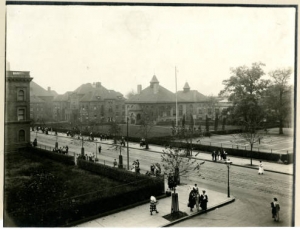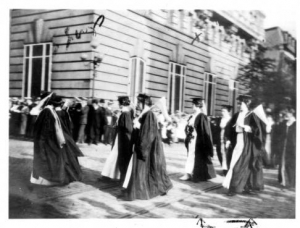
101 years ago, Goucher students met to discuss article ideas for the first November issue of the Goucher College Weekly – the very beginnings of yours truly, The Quindecim. In some ways, the topics they chose to write about reflected the same fall spirit we have today. Halloween was as much a cause for celebration then as it is now. Parties held at Goucher included bobbing for apples, dancing, “orchestral selections”, and refreshments. Yet, students at the time did not parade their costumes down Van Meter or scavenge through Heubeck. In fact, Van Meter and Heubeck Hall would not come to being until several decades later, when Goucher moved to its present location. Instead, the all-female student body celebrated Halloween in places like Vingolf Hall, part of an original campus located on 23rd and St. Paul Street, Baltimore. Examining one of The Q‘s earliest issues, I invite you to discover a universe both familiar and strange by traveling back to a Goucher of the past.
A politically charged environment defined November of 1916 as the U.S. held its 33rd presidential election. While women had not yet obtained suffrage in the country (the 19th Amendment would not be ratified until 1920), Goucher students expressed a strong civic spirit. A very successful campaign rally was organized in the college gymnasium, Catherine Hooper Hall, where anyone could hear “remnants of campaign songs and powerful yells of ‘Wilson, Wilson!’ and ‘Hughes, Hughes!’”. Goucher women impersonated the two main political candidates, Woodrow Wilson, the Democratic, presidential incumbent, and Supreme Court Justice Charles Evans Hughes, the Republican nominee, arguing their case and explaining their platform. Apparently, a few students supporting the Socialist and Prohibition nominees (Newspaper editor, Allan L Benson and ex-Governor of Louisiana, J. Frank Hanley, respectively) “united forces [and] loudly proclaimed the merits of both candidates, yelling with admirable impartiality, ‘Ice-cream, soda-water, ginger-ale, pop; Benson, Benson always on top;’ followed by, ‘Wipe out the booze hop, every one.’”

Prohibition in particular shaped political discussions on campus. “About sixty undergraduates and ten members of the faculty” marched in a Prohibition parade that was held in Baltimore on November 4th. The Prohibition Party had been the first to accept women into its fold and had been used as a platform to both advance restrictions on the sale of alcohol and to advocate for women’s rights. In many ways, the two objectives overlapped- women of the early 20th century were largely confined to the home where the consequences of drunkenness were often experienced. It was with this intersection in mind that Dr. Hogue addressed Goucher women in the chapel, urging them to fight for prohibition. According to the results of a straw vote, 460 Goucher students supported prohibition and 46 were against it. Interestingly, in the same vote, 416 students claimed to support suffrage while 90 claimed to be opposed.
While Goucher women seemed preoccupied with domestic politics for the most part, one former student pointed to an important international political context. While the US would not officially join the Allies until 1917, WWI had long been underway in Europe. Hilda C Rodway, presumably a British student who had attended Goucher, hinted at this in a letter addressed to her friends and peers. “I am fully occupied at a military hospital in Liverpool… It certainly makes one realize what war is when one is surrounded all day with its awful results.”
It appears that, because war was still a whole ocean away, students remained blissfully ignorant of its devastation. Or at least, they avoided mentioning it in any article published in the November issue of 1916. Instead, the everyday topics covered by the rest of the articles in the issue communicated a sense of normality. One student wrote in complaint of the continuous reminders to comply with college rules, “We are so tired of listening to ‘Be good’ lectures!” A mysterious public service announcement on one page stated, “Goucher College Book Store. If you do not see what you want, ask William.” Finally, the issue ended with three separate sports features describing an apparently noteworthy defeat of the Senior class in a tennis match against the Junior class. Were it not for the corset ads interspersed between the articles, you could almost imagine yourself back in 2017.
